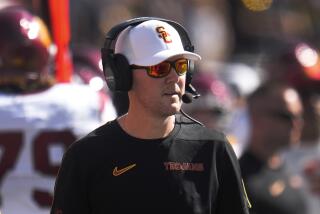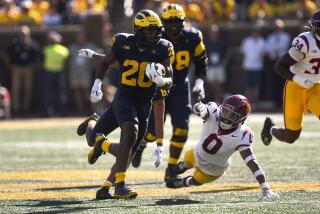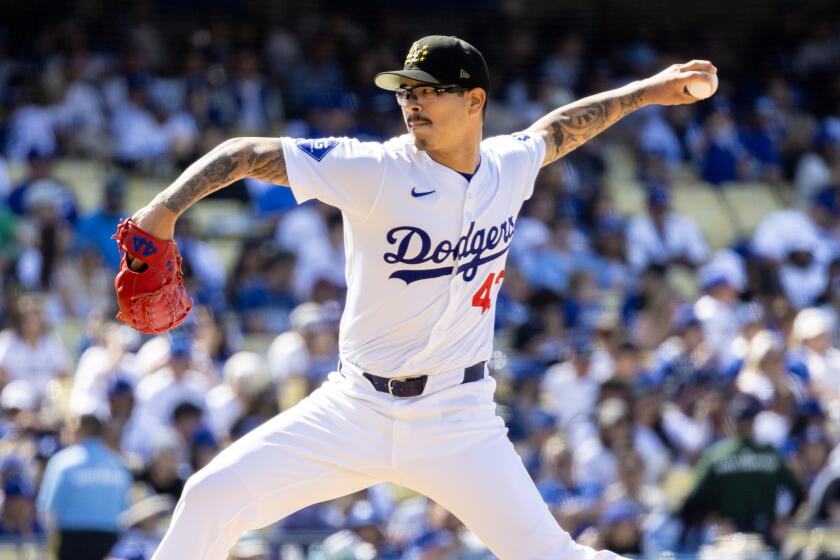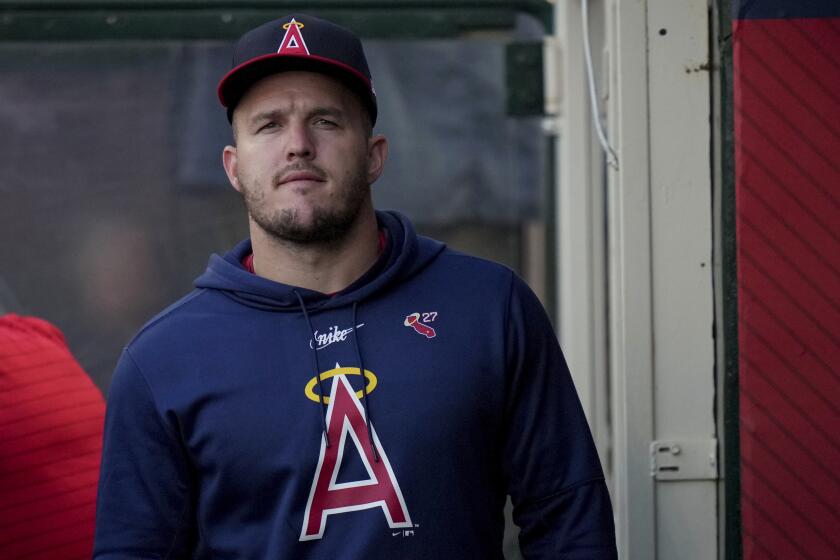That Caps It : Talking of Salaries, Football Has a Thing or Two to Teach Baseball
The lights have been out for more than a week now, and the major league baseball player is growing curious.
We’re on strike over what, a salary cap? Exactly what is that? And how bad could it be?
The baseball player shoots a stream of tobacco juice into a decorative paper cup at his bedside.
He picks up the phone.
He calls the professional football player.
Stretched out next to his own decorative paper cup, the football player has been napping.
Football player: Hullo? Hullo? I don’t care if your name is George Halas, I am not signing with your team for the minimum salary! I have played 12 good years and gone to three Pro Bowls and been interviewed by Downtown Julie Brown. I deserve better!
Baseball player: Relax, relax. I’m your friend.
Football player: Yeah, that’s what Gene Upshaw said.
Baseball player: I’m a member of baseball’s players association.
Football player: Oh, the good union.
Baseball player: Sorry to bother you, but I want to know if it is worth it for us to stay out of work just because our owners want to impose a salary cap.
Football player: No bother. I don’t have to make another delivery for 30 minutes. There is not much demand for pizza in the middle of the day.
Baseball player: Pizza? I thought you were a linebacker?
Football player: Yeah, and you probably thought Phil Simms was a quarterback.
Baseball player: Explain.
Football player: Since the salary cap was instituted in February, older stars have either lost their jobs--like New York Giant quarterback Simms--or been forced to leave longtime homes to join new teams willing to keep them at greatly reduced contracts.
Baseball player: But wasn’t Simms struggling in his recovery from shoulder surgery?
Football player: It doesn’t matter if he had spent the entire off-season in a body cast. The only other Giant quarterbacks are guys named Dave Brown and Kent Graham, who combined on eight completions for zero touchdowns last year.
Do you really think Simms would have been cut if his $2.5-million average salary didn’t have to fit under a $34.6-million salary umbrella dominated by high salaries being paid such young players as Carlton Bailey and Mike Sherrard?
If the salary cap were honored with a commemorative postage stamp, Phil Simms’ face would be on that stamp.
Baseball player (nervously): Any other examples?
Football player: How much time do you have before your next baseball card show?
Warren Moon leads the Houston Oilers to 11 consecutive victories and a division championship, then is traded to the Minnesota Vikings because the Oilers can’t pay both him and younger backup quarterback Cody Carlson.
Rickey Jackson spends 13 years as a linebacker and hero with the New Orleans Saints, but the Saints can’t afford him anymore, and today he plays for minimum $162,000 salary for the San Francisco 49ers.
Steve (Mongo) McMichael, the growling symbol of the Chicago Bears’ defense, is now a--gasp!--Green Bay Packer. Reason? The Bears couldn’t fit his $1-million salary into their you-know-what.
And those players are considered lucky because they found work.
You could construct an all-star team of players who are still looking for jobs, including running back Lorenzo White, offensive lineman Dave Richards, defensive end Charles Mann, linebacker Karl Mecklenberg, cornerback Najee Mustafaa, safety Dennis Smith, kicker Mike Cofer.
Baseball player: What does the football community think about this?
Football player: The players are openly outraged and general managers are quietly frustrated. League officials are kept busy telling both sides to keep their mouths shut and play ball.
Baseball player: What about the coaches?
Football player: The coaches aren’t saying anything--yet.
But wait until the first locker-room fight over salary disparity.
Wait until Thanksgiving, when the usual injuries have forced teams to rely on the usual veteran substitutes--and those guys aren’t there because of the salary cap.
Wait until the San Francisco 49ers go into the playoffs with Bill Musgrave at quarterback and Derek Loville at running back.
Baseball player: Not that any of that matters. Aren’t the Dallas Cowboys going to beat everybody again?
Football player: You’ve been eating too many sunflower seeds. The salary cap robbed the Cowboys of three key players from their defensive front seven, two-fifths of their offensive line and a nice little kicker.
If the Cowboys have any serious injuries anywhere, Barry Switzer is going to have to bring Thomas Lott out of retirement.
Baseball player: What are the football players saying about all this?
Football player: Let’s check in with Duane Bickett, former Trojan and former Pro Bowl linebacker for the Indianapolis Colts.
One minute Bickett was designated as the Colts’ “franchise” player, symbolically the most important member of the team, given a contract averaging $2 million a year over two years.
The next minute--actually several minutes after the salary cap went into effect in February--he was cut.
Today, after several uneasy months of unemployment, he plays for the Seattle Seahawks on a two-year contract averaging $700,000 a year.
And although he doesn’t dare complain, he wonders.
“I don’t remember agreeing to anything about a salary cap,” Bickett said. “I can’t even find one person who agreed to it.”
Bickett said that, like many players, he was stunned by the effects of the cap.
“I didn’t have any warning about losing my job,” he said. “One day (the Colts) are saying, ‘You’re a special player,’ the next day you are gone.”
Baseball player: But how about some of the players who benefited from the new agreement, the great players who made a lot of money because football players were given free agency as well as a cap?
Football player: Let’s check in with John Elway, who will average $4.775 million a year through 1996.
“It’s funny, but basketball players take a cap to court, baseball players refuse to have a cap, and yet we accept it?” Elway asked. “Well, one good thing to come out of this is that Gene Upshaw (union chief) still has his job.”
Baseball player: But surely the general managers enjoy having fixed costs.
Football player: Let’s check in with Dick Steinberg, who used free agency to put together a decent New York Jet team that he has since restructured because of the cap.
Steinberg said he thinks the system will work, but says it hasn’t been fun.
“With the salary cap, our hands have been tied,” Steinberg said. “The cap has been with us every day, 24 hours a day. We have been severely restricted.”
Baseball player: Didn’t anybody know it would be this bad? Why would the football union have agreed to a cap when everything seemed to be going so well with your new free agency?
Football player: The key to the cap agreement was that it did not come after free agency, but in conjunction with free agency.
In order for the players to finally win their freedom from the owners, they first had to agree to the cap.
Union officials believe the benefits of free agency outweigh any problems with restrictive salaries.
“Players are crying about the cap like it came after free agency, but they have to realize, for 72 years before his agreement, they never had free agency,” said Clark Gaines, former NFL running back who tried to educate the players in his job as a regional director for the union. “I’m not a supporter of the cap, I’m a supporter of the entire agreement.”
Baseball player: Does anybody else besides union officials feel that way?
Football player: Actually, there are segments throughout the industry that feel the system, as a whole, is working.
Supporters point to the fact that free agency led to a 51% increase in league salaries last year.
Seven years ago, the average salary was $198,000. Last season it was $737,000.
Although the cap puts a $34.6-million ceiling on salaries, it also forced teams to spend at least $31 million, which has allowed small-market teams like Cincinnati and Tampa Bay to improve.
“Everybody is being too one-dimensional when it comes to the cap,” said Carmen Policy, San Francisco 49er president. “You talk Phil Simms, I’ll talk Reggie White (defensive lineman who signed a $17-million contract with Green Bay Packers as a free agent).
“I’ll even talk Steve Bono, a quarterback who probably would have never played for us. With the cap, we have to move him, and he goes to a place (Kansas City) where he will do well financially and have a chance to play.”
Baseball player: Well, football’s popularity is at an all-time high, right? Didn’t a recent poll say that 40% of youngsters rate the NFL as their favorite sport, nearly double the percentage who favor baseball?
The game must be doing something right, huh?
Football player: Observers note that only good things have happened since the settlement agreement was approved in April of 1993.
Fox-TV shelled out more than $1.5 billion to televise NFL games. More than 100 new jobs were created with expansion to Charlotte and Jacksonville.
The World League of American Football was reinstated, adding more jobs. And a new satellite network was formed, finally allowing the league and players to profit from thousands of sports bars that have been stealing NFL games.
“I don’t think you can pass judgment on the cap after just one year,” said Jack Wirth, one of the few optimistic agents. “Look at the revenues. They are growing every year. Next year I think the cap could be at $36.1 million, and as the league gets healthier, it’s only going to grow.”
Baseball player: Our sport could certainly stand to get healthier.
Football player: But players believe football would have gotten healthier without the cap. They also figure that free agency could have been granted without the cap.
After all, who won the landmark court battle between the players and the owners in late 1992?
It was this decision--in which a jury ruled that the NFL’s rules on player movement were too restrictive--that led to the settlement in the first place.
“We finally had the owners, we were finally in a position of power,” Bickett said. “Then the union let it get away.”
Countered Doug Allen, union assistant executive director, “Our new system rewards performance, which is how everyone should want it. Right now we have a whole bunch more players making a whole bunch more money.”
Baseball player: So what would a cap mean for baseball?
Football player: Are you sitting down?
No more players like George Brett spending their entire careers in small markets like Kansas City.
And no more lovable veterans ending their careers with high-salaried championship teams.
If there had been a salary cap in 1988, there’s no way Mickey Hatcher helps lead the Dodgers to the World Series title. Bob Boone would not have played with the 1986 Angels. And Tim Flannery would have been long since waived when the 1984 San Diego Padres won the pennant.
In a game tailored for heroes, no more heroes.
Baseball player: Some say that with the prevailing arrogant and elitist attitude in our sport, there are no more heroes anyway.
Football player: We don’t believe that. In fact, can you send us your autograph?
Baseball player: Cash or check?
More to Read
Go beyond the scoreboard
Get the latest on L.A.'s teams in the daily Sports Report newsletter.
You may occasionally receive promotional content from the Los Angeles Times.











